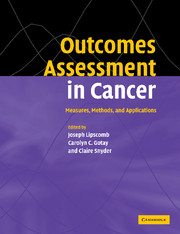Book contents
- Frontmatter
- Contents
- List of contributors
- Acknowledgments
- 1 Introduction to Outcomes Assessment in Cancer
- Health-related quality of life in cancer: general concepts and generic measures
- Assessing health-related quality of life during treatment
- Assessing health-related quality of life across the cancer continuum
- Measuring the experience and needs of cancer patients and caregivers
- 13 Patient advocate perspective on health-related quality of life issues with prostate cancer survivors
- 14 Measuring the patient's perspective on the interpersonal aspects of cancer care
- 15 Needs assessment in cancer
- 16 Assessing the subjective impact of caregiving on informal caregivers of cancer patients
- Methodological considerations in applications to cancer outcomes research
- Modern psychometric theory in cancer outcomes research
- Assessing the economic impact of cancer
- Research and policy implications
- Invited papers
- Index
- References
13 - Patient advocate perspective on health-related quality of life issues with prostate cancer survivors
Published online by Cambridge University Press: 18 December 2009
- Frontmatter
- Contents
- List of contributors
- Acknowledgments
- 1 Introduction to Outcomes Assessment in Cancer
- Health-related quality of life in cancer: general concepts and generic measures
- Assessing health-related quality of life during treatment
- Assessing health-related quality of life across the cancer continuum
- Measuring the experience and needs of cancer patients and caregivers
- 13 Patient advocate perspective on health-related quality of life issues with prostate cancer survivors
- 14 Measuring the patient's perspective on the interpersonal aspects of cancer care
- 15 Needs assessment in cancer
- 16 Assessing the subjective impact of caregiving on informal caregivers of cancer patients
- Methodological considerations in applications to cancer outcomes research
- Modern psychometric theory in cancer outcomes research
- Assessing the economic impact of cancer
- Research and policy implications
- Invited papers
- Index
- References
Summary
“Survivorship is the experience of living with, through or beyond cancer”
Introduction
In the past 20 years, the use of prostate-specific antigen (PSA) testing to diagnose prostate cancer, and improved techniques for treating the disease, have resulted in a dramatic rise in the long-term survival rate of prostate cancer patients. Oncologists have focused on the narrow goal of shrinking (or removing) the tumor to increase the survival of cancer patients. However, from the survivors' perspective, preserving health-related quality of life (HRQOL) is the most important consideration, even more than extending life and delaying the progression of disease. It is important to keep in mind that prostate cancer is not just a disease with associated medical treatment. Beginning at the time of diagnosis and extending through treatment and beyond, survivors experience physical, emotional, and social impacts.
The purpose of this chapter is to provide the perspective of a prostate cancer survivor, based on my almost 11 years of activities as an advocate, activist, and facilitator who has observed survivors and their families in support group activities in local, regional, and national venues. The chapter tells the story, from the patient's perspective, of what it means to be a cancer survivor and the role HRQOL plays in the life of a survivor.
HRQOL from the survivor's perspective
A review of the literature reveals that, when surveyed about their HRQOL, most survivors and their clinicians focus on the physical symptoms and limitations imposed by cancer and its treatments.
- Type
- Chapter
- Information
- Outcomes Assessment in CancerMeasures, Methods and Applications, pp. 286 - 289Publisher: Cambridge University PressPrint publication year: 2004
References
- 1
- Cited by



